LONDON: Huda Al-Rasheed’s first visit to the BBC was meant to be as a tourist enjoying a relaxed look-around. Instead, it turned into an audition for a job that transformed her into an accidental trailblazer when she became the first Saudi woman newsreader on BBC Arabic.
“It changed my life,” says Al-Rasheed.
Now, 43 years after she first uttered the words “Huna London” (“This is London“), Al-Rasheed remains a familiar voice to millions around the globe and to several generations.
Her path into broadcasting was far from smooth, however. Al-Rasheed’s father strongly opposed her ambition to work in radio — so much so that he forbade her to speak of it in public. But she ended up winning not only her father’s pride but also a place in both Saudi and broadcasting history.
But all that was far from her mind back in 1974 when Al-Rasheed arrived in London for a 10-week English-language course.
“I discovered the course organizer was married to a man who worked at the BBC so I asked if he could arrange a tour. The BBC wanted a letter from the Saudi Embassy. So I got one and because it was an official letter, the BBC invited me to spend a week with them,” she recalls.
It may not have been the intention, but it gave the BBC and Al-Rasheed the chance to have a good look at each other. At the end of the week, and only days before her return to Jeddah, she was handed a job application form.
“There was also a test which they said I could take at the British consulate,” said Al-Rasheed. “It was Ramadan and I was fasting. I went and took the test, but I didn’t tell anyone.”
She passed, but there was no promise of a job. At the time, Al-Rasheed was living with her married brother in Jeddah and trying hard to break into full-time broadcasting.
“It was my dream since childhood. The family used to call me ‘Broadcaster’ because I knew all the timings of all the programs. But whenever I said I really wanted to be a broadcaster, my father ignored me, or else he would say, ‘When I die’.”
Al-Rasheed was born and spent her earliest years in Onaza, in Najd province, north of Riyadh, but was packed off to boarding school when she was six, first to Lebanon and then to Alexandria in Egypt.
“My father valued education, but he did not think broadcasting was a suitable job because men and women worked closely together. He thought I might go astray. At the time, there were no women working for Saudi broadcasting, but I heard they were looking for someone to present an informative program about development in Saudi Arabia. My father said, ‘You can try, but you will fail.’ That made me even more determined.”
She encountered even more resistance after she got the job. “I had so many problems with jealousy from both other women and from men who didn’t think I should be there. My father was pleased. He thought it would make me give up.”
Then came a call from London, via the British embassy, with a job offer, starting immediately. But first, Al-Rasheed had to face her father, who was working in Damascus at the time.
To her amazement, he voiced no objection. “He said, ‘If your brother doesn’t mind, then I don’t mind.’”
Al-Rasheed’s brother, a pilot, had taken the same view — if their father didn’t mind, neither did he. There was nothing standing in her way, and with her father still predicting failure, she had everything to prove.
On Sept. 10, 1974, she began her new life at BBC Arabic. The training was intensive and everything about London seemed bewildering.
“I walked around with my eyes popping out of my head.” She lodged with a couple in Wimbledon, south London — “They were like parents to me” — but was desperately homesick.
“The weather was horrible, I wanted my own food and I was lonely. I spent my days off just watching television. But I never thought of going back because I was doing what I wanted to do and you have to take the rough with the smooth. For a year, it was hell. After that, I started going to the cinema, to concerts, traveling. I began to find my way.”
When her father heard her voice on the radio for the first time, all his disapproval melted away. The man who had forbidden his daughter to even speak of her ambitions now openly boasted about her. The next time Al-Rasheed visited him, they went out walking together so he could stop people in the street and introduce “my daughter who works for the BBC in London.”
She discovered that at home her father kept one of his many radio sets permanently tuned to BBC Arabic. “It was next to where he had lunch and no one was allowed to touch it,” she said.
Back at Bush House, the former headquarters of the BBC World Service and the broadcaster’s foreign language satellites, Al-Rasheed was reading and reporting the news. She covered the state visits to Britain of King Fahd of Saudi Arabia and the Sultan of Oman, and went to Buckingham Palace to report on preparations for the royal banquets.
Which did she enjoy most? “All of it,” she replied without hesitation.
The Saudi broadcasting company also tried to entice her back. “I told the head of Saudi TV that I do not cover my hair. He said, ‘You don’t have to.’ So I was the first Saudi woman to appear uncovered. But I didn’t want to stay in Riyadh. I loved my job and couldn’t live without it.”
However, she had always regretted not going to university, so in 1989 Al-Rasheed left the BBC to study for a degree in history and English literature at the University of Buckingham. She subsequently gained master’s degrees in media studies and in linguistics and translation. After graduating, she returned to BBC Arabic as a freelance.
Referring to a radio career that has spanned four decades, she said: “It’s a real blessing to be so appreciated.”
Her flat in West London is filled with beautiful rugs and books in Arabic and English. She has published three novels of her own and had a play performed.
She follows current affairs closely and is enthralled by the changes in her own homeland. Does she see herself as a role model for other would-be Saudi career women?
She shrugs. “I knew what I wanted to do and I didn’t give up. That’s what women everywhere have to do.”
Saudi trailblazer Huda Al-Rasheed’s message to women: never give up on your dreams
Saudi trailblazer Huda Al-Rasheed’s message to women: never give up on your dreams

KSrelief provides food and shelter assistance in three Syrian cities

RIYADH: Saudi Arabia provided food, shelter and winter kits to the Syrian people through its aid agency, KSrelief, as part of several humanitarian missions across Syria.
The agency on Wednesday distributed bags of flour, winter kits and personal care kits to 132 families in the city of Al-Rastan in Homs, benefitting 626 individuals.
KSrelief also distributed food parcels and health kits to 1,455 families in the Afrin and Azaz regions in Aleppo, benefiting 8,730 individuals.
KSrelief on Thursday distributed 1,224 bags of flour, food baskets, personal care bags and shelter kits to 306 families in the city of Douma.
The efforts are part of Saudi Arabia’s ongoing commitment to deliver humanitarian assistance aimed at alleviating the suffering of the Syrian people.
KSrelief’s global humanitarian efforts continue

RIYADH: The King Salman Humanitarian Aid and Relief Center’s (KSrelief) humanitarian efforts continue for distressed families and individuals in need of support from basic food supplies to medical intervention.
In Sudan’s Gedaref State, Saudi Arabia’s aid agency handed out 1,117 boxes of dates to benefit 10,114 individuals displaced by the continuing conflict in the country.
In Mali’s city of Segou, KSrelief distributed 1,000 food parcels benefiting 5,600 individuals from the most vulnerable groups including internally displaced persons, widows, and people with special needs. The initiative is part of agency’s food-security support project in the country and the wider global community.
In Afghanistan’s Nangarhar Province, KSrelief turned over 276 shelter bags and 276 tents as part of the shelter project for returnees from Pakistan and those affected by the 2024 floods.
The ongoing initiative aims to distribute 4,882 various shelter materials such as tents, blankets, plastic mattresses and other basic shelter supplies in several cities in Afghanistan.
In Somalia, the national blood bank in Mogadishu – operated by KSrelief – managed to help 222 individuals in December.
In Jordan, another batch of Syrian refugees graduated from a KSrelief-run training and educational course being run at the Zaatari Refugee Camp. A total of 343 students received training on sewing, embroidery, handicrafts, culinary arts and painting. Remedial lessons were also given to elementary school students in subjects such as mathematics, Arabic and English, as well as a literacy course and Qur’anic studies.
Wild ghee production: Tradition of the Northern Borders region

- Wild ghee production peaks during the winter months due to high local demand
- Northern women showcase their ghee and other handicrafts at various festivals and national events
ARAR: In the Northern Borders region, women have long excelled in producing wild ghee, a staple deeply rooted in the local culture and closely tied to the region’s abundant livestock, estimated by the Ministry of Environment, Water and Agriculture to exceed 7 million cattle and camels.
Wild ghee production peaks during the winter months due to high local demand and is a key ingredient in many popular dishes, including porridge and festive meals.

Umm Nada, a local ghee producer, describes the multi-stage process: starting with milking, the milk is heated, boiled, slightly cooled, and mixed with a starter culture to transform it into “Khathir,” a traditional dairy product of naturally fermented or curdled milk similar to yogurt or kefir.
The mixture is then churned for over half an hour in a goatskin or sheepskin container called a “Samil.” After several days of mixing, the butter is melted over fire, turning into wild ghee, which is then stored in leather containers known as “Al-Nahw” or “Al-Dharf.”
Northern women showcase their ghee and other handicrafts at various festivals and national events, with the Arar market and the Lavender Hall, which provides training and development for local producers, serving as key venues for these traditional crafts.

Saudi nature reserve unveils winter retreat near historic Laynah village

- Laynah Camp, designed for nature lovers and desert enthusiasts, is located adjacent to the Al-Dahna Desert
- The initiative is part of the Darb Zubaydah Winter festival, which aims to promote sustainable ecotourism
RAFHA: A winter season retreat close the historic Laynah village in the Northern Borders Region is now open to holidaymakers.
Designed for nature lovers and desert enthusiasts, the wilderness retreat called Laynah Camp was unveiled this week by the Imam Turki Bin Abdullah Royal Nature Reserve Development Authority (ITBA) as part of the Darb Zubaydah Winter festival, which aims to promote sustainable ecotourism and preserve the region’s cultural and historical heritage.
Laynah Camp “offers a serene atmosphere where wildlife beauty blends with the desert’s charm, providing visitors with inspiring and adventurous moments,” a Saudi Press Agency (SPA) report enthused.

Nestled amid Al-Dahna Desert, the fully equipped tent accommodation units provide breathtaking views of the natural surroundings, the report added.
To spice up the camping experience, various activities are offered, including exploratory trips and upscale camping.
Laynah village itself has its own attractions, particularly its ancient water wells, which makes it one of the most important historical sites in the Kingdom.
In a previous SPA report, researcher and heritage and antiquities expert Abdulrahman bin Mohammed Al-Tuwaijri was quoted as saying Laynah village is known to be one of the oldest settlements in the Arabian Peninsula.
“Located on the ancient trade route between Najd and Iraq, it has throughout history provided traveling caravan convoys with respite from harsh desert conditions,” the report said.
How honeybees drive biodiversity and strengthen ecosystems in Saudi Arabia and beyond

- By protecting honeybees, the Imam Turki bin Abdullah Royal Reserve provides a boost for the sustainable honey industry
- This keystone species, essential for sustaining life on Earth, faces threats from climate change, habitat loss, pesticides, and disease
RIYADH: Beyond the manufacture of honey, honeybees are also guardians of biodiversity and strong ecosystems. As a keystone species, they support plant diversity by pollinating wildflowers and provide a welcome boost to agricultural productivity.
Although small in size, without these precious insects, cascading effects could destabilize entire food chains and habitats for countless organisms.
Recognizing their importance, Saudi Arabia has undertaken active conservation efforts, demonstrating the Kingdom’s commitment to sustainable beekeeping and the protection of these industrious insects.

Together with other pollinators such as birds and bats, bees are vital to global agriculture, contributing to 35 percent of the world’s crop production by pollinating 87 of 115 leading food crops, according to the Food and Agriculture Organization.
Honeybees help to maintain plant diversity by pollinating a wide range of species, preventing any single plant from dominating. This balance is crucial for ecosystem resilience, enabling them to better withstand environmental challenges such as climate change and invasive species.
Wildflowers, which rely heavily on honeybees for reproduction, play a key role in this balance. These flowers provide food and shelter for birds, insects and small mammals, creating a ripple effect that supports a diverse array of species throughout the ecosystem.
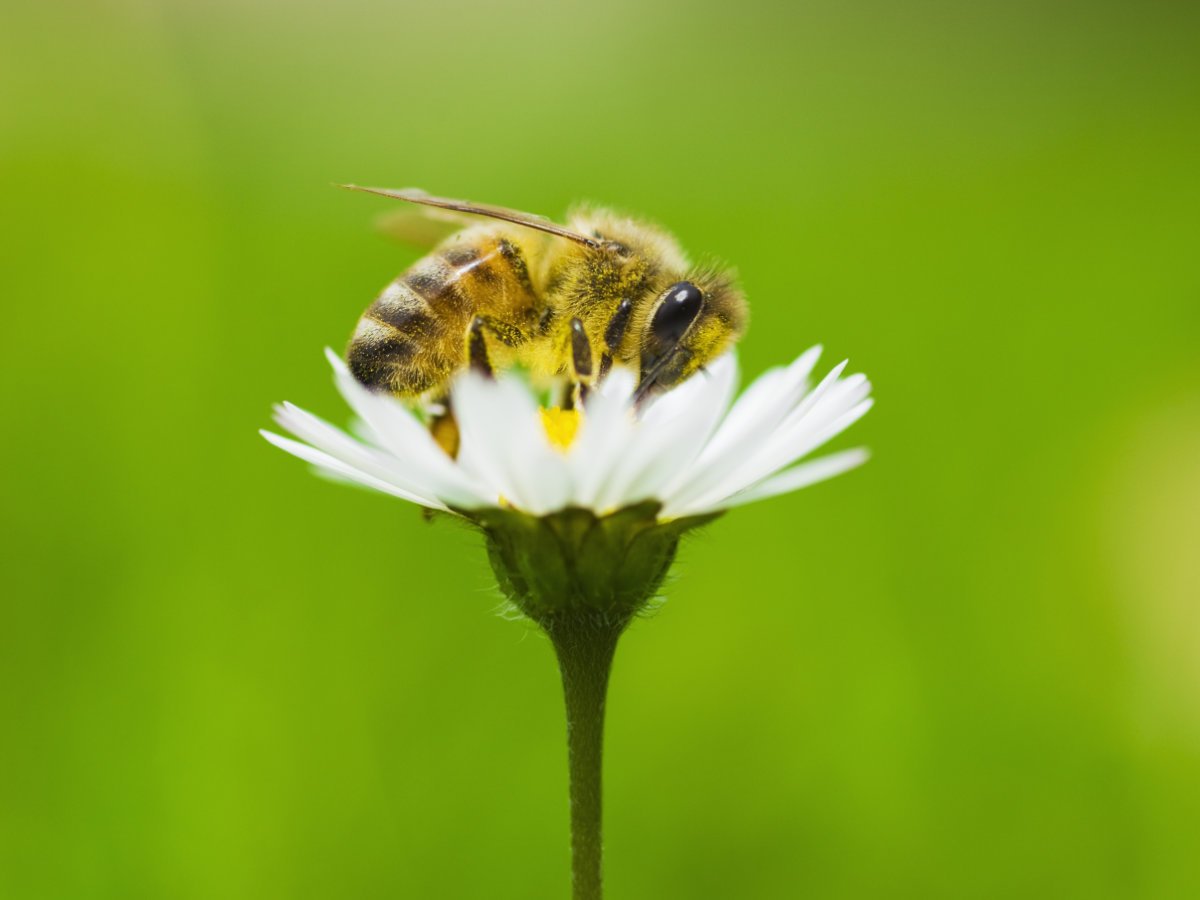
In Saudi Arabia, the Imam Turki bin Abdullah Royal Reserve hosts 25,737 beehives across 256 sites, fostering honeybee populations in a thriving and protected environment.
“The reserve provides a naturally protected environment rich in flowering plants, which serve as a primary source of nectar and pollen,” Abdulmajeed Al-Dhaban, a spokesperson for the reserve’s development authority, told Arab News.
“This ideal ecosystem enables bees to produce large quantities of high-quality honey, as well as other hive products like beeswax and royal jelly, which hold significant nutritional and economic value.”
Opinion
This section contains relevant reference points, placed in (Opinion field)
Thanks in part to the bees’ services, the reserve plays a vital role in enhancing the Kingdom’s food security.
“In addition to honey production, the reserve’s diverse ecosystem sustains natural pollination cycles,” Al-Dhaban said.
“This contributes to the productivity and quality of nearby cultivated crops and aligns with Saudi Arabia’s national efforts to achieve food security and self-sufficiency.”

Noting that pollination has a critical impact on the global food system, Al-Dhaban said bees are among the most efficient agents for transferring pollen between plants.
“This process not only enhances seed quality and density but also boosts agricultural crop production in terms of both quantity and quality,” he said. “Bee activity contributes directly to the production of honey, a valuable food product with significant health and economic benefits.”
Al-Dhaban also emphasized that honeybees are crucial for supporting food security and ensuring the long-term sustainability of natural resources.
This is particularly important as the reserve’s biodiversity creates an ideal environment for key Saudi crops, including acacia, Sidr trees and caper shrubs.
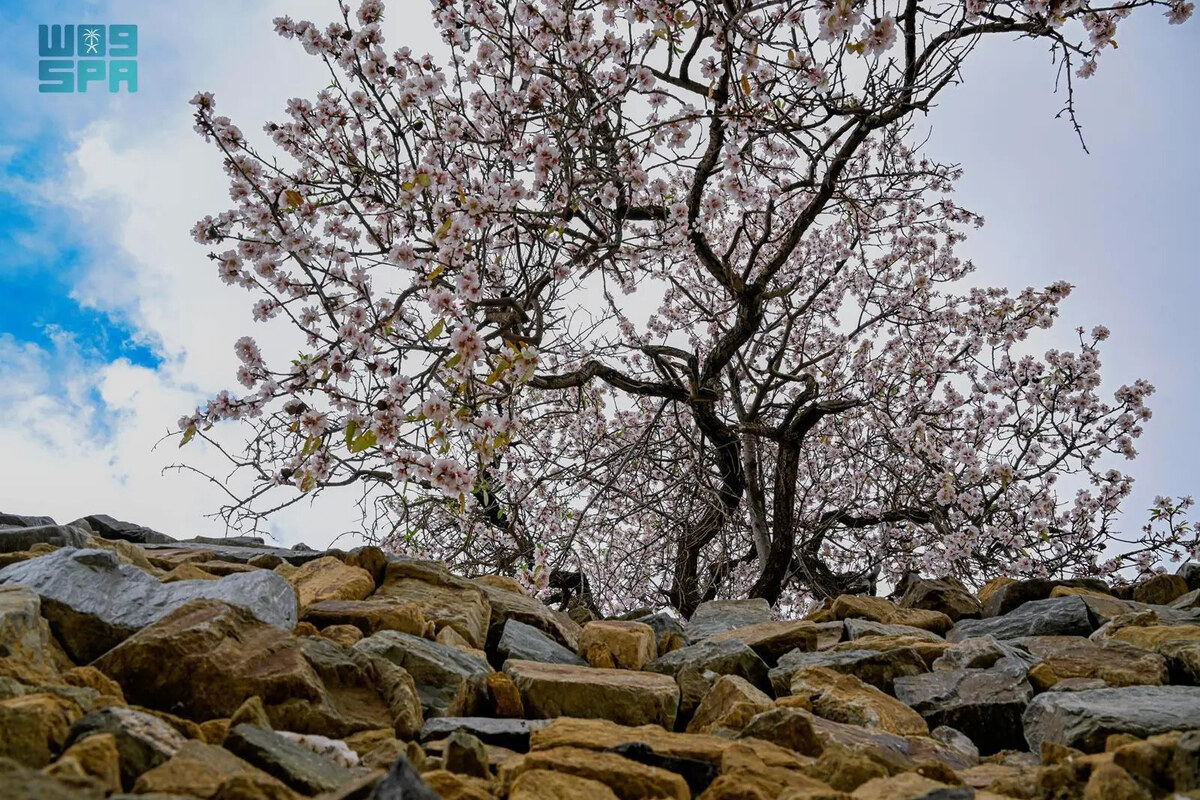
These plants benefit directly from bee pollination, which also increases the production of high-quality nectar for honey and other hive products. This natural cycle, Al-Dhaban said, supports local food supplies and strengthens the regional economy.
“By reducing reliance on imports and promoting local honey production, the reserve positions Saudi Arabia as a leader in sustainable honey sector development,” he said.
However, honeybee populations face serious threats, including climate change, habitat loss, pesticide use and disease.
To tackle this challenge, Mefleh Al-Jabreen, a beekeeper and owner of mobile apiaries at the Imam Turki bin Abdullah Royal Reserve, highlights the importance of selecting bee breeds that balance honey production and reproduction.
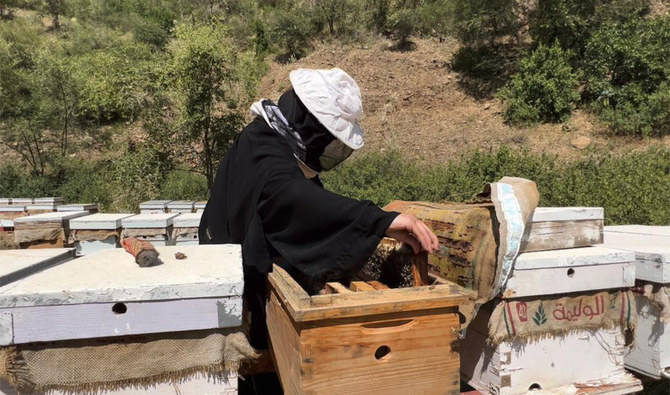
He told Arab News that his bees are transported to pastures rich in wild flowering trees, providing them with abundant nectar and pollen.
“We extract a specific amount of honey during gathering periods, leaving enough for the bees to sustain their hives,” he said.
Al-Jabreen explained that these sustainable practices help to maintain healthy honeybee populations while ensuring high-quality production.
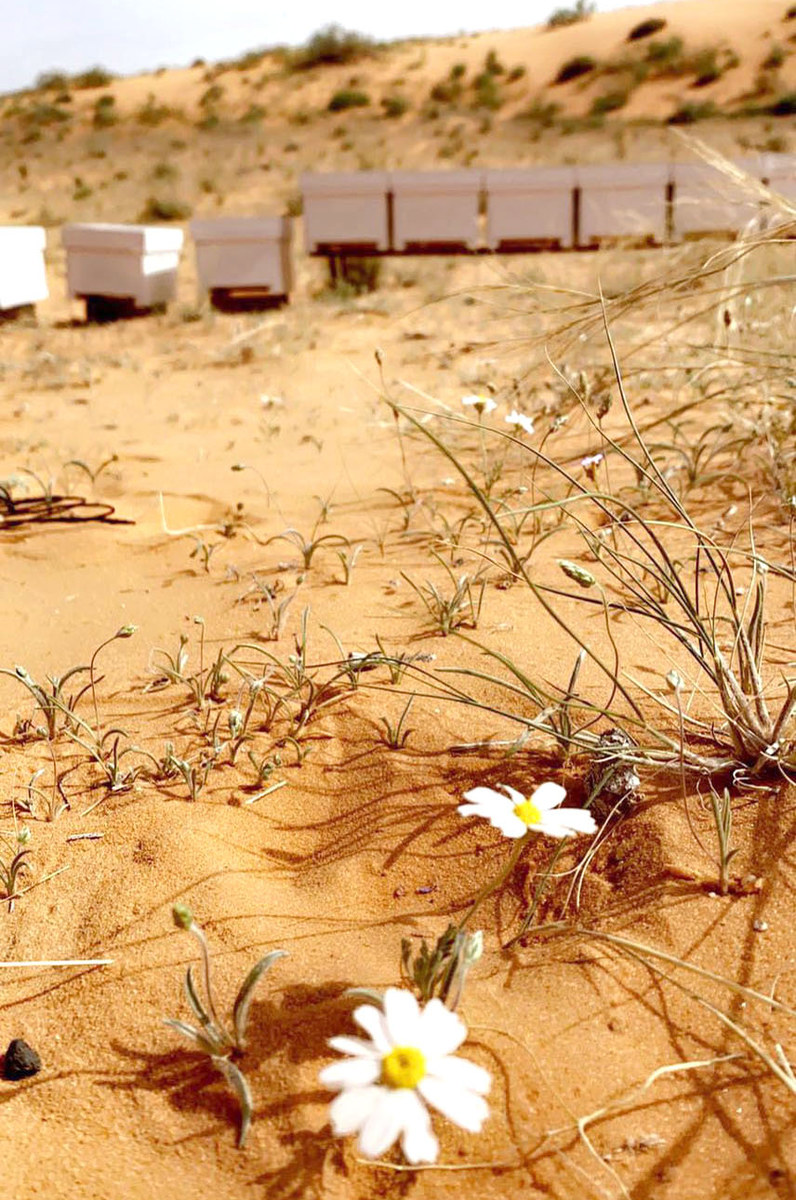
The reserve’s botanical diversity also supports the production of more than seven varieties of wild honey, many of which have earned international recognition for their quality.
Al-Jabreen also noted that the health of a hive largely depends on the queen bee. “A young, active queen laying eggs abundantly forms the foundation of a stable hive,” he said.
DID YOU KNOW?
• Crops, such as almonds and vanilla, are almost entirely dependent on honeybee pollination.
• Honeybee pollination prevents any single plant species from dominating, maintaining ecosystem balance.
• A young, active queen laying eggs abundantly forms the foundation of a stable hive.
He added that it is also crucial to monitor the number of worker bees and ensure the hive remains free of diseases and parasites, which can threaten colony stability and productivity.
Environmental challenges, such as extreme temperatures and unpredictable weather, pose significant threats to honeybee health, disrupting key hive processes such as honey production and reproduction.
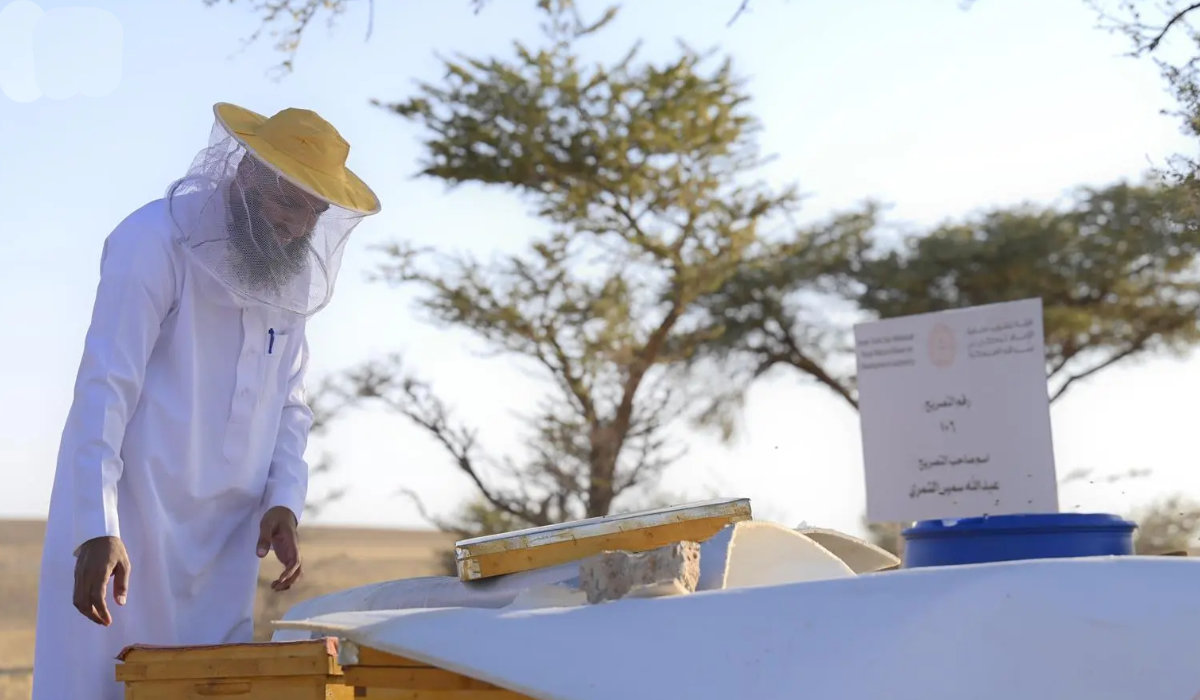
Al-Jabreen said that several factors must be considered when addressing these challenges: “These strategies include hive insulation, which helps reduce heat stress in extreme temperatures.”
Meanwhile, tree cover and shaded areas protect hives from direct sunlight during hot weather, while relocating hives to coastal regions in winter helps to keep bees active and productive.
“Windbreakers and hive relocation shield honeybees from strong winds and cold climates,” he added.
Al-Jabreen emphasized that plant diversity is essential for the survival of honeybees. “Bees are a vital part of the interconnected ecosystem, and their well-being depends on an abundance of floral and crop resources,” he said.
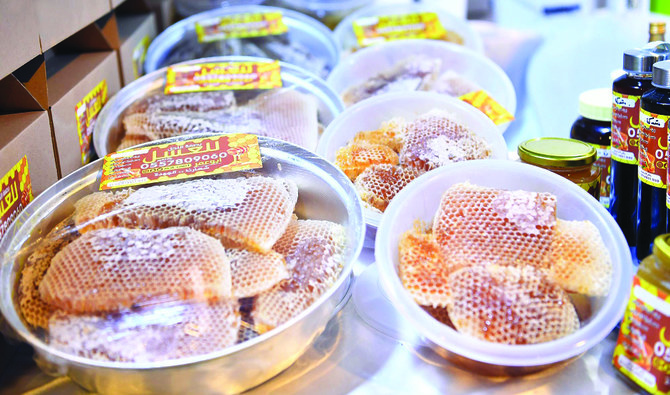
Recent innovations in beekeeping are helping to protect honeybee populations and enhance hive productivity. Al-Jabreen highlighted several key advances, such as special pollen-collecting boxes and bee breeds adapted to local climates.
He also hailed the growing collaboration between beekeepers and farmers. Organic farming practices, which avoid harmful chemicals, create safer environments for bees to thrive.
“We work with farmers to coordinate pesticide spraying schedules and relocate hives to safer areas,” Al-Jabreen said.
With growing threats to honeybee populations, governments, researchers and communities must prioritize their protection. Safeguarding these vital pollinators is key to ensuring a sustainable future for ecosystems, agriculture, and global food security.






















